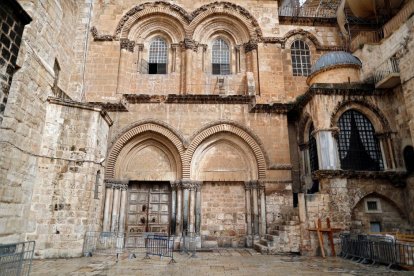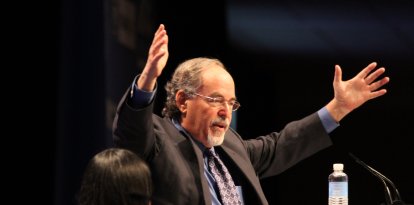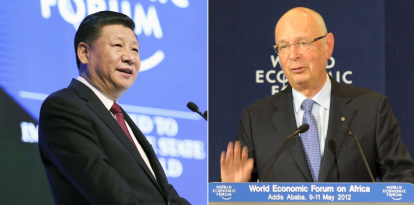Christians prefer living in Israel, not the Palestinian Authority
Among the top 50 countries in which Christians were persecuted in 2023 were Yemen, Libya, Iran, Afghanistan, Iraq, Morocco, Qatar, Egypt, Turkey, and other Middle Eastern and Muslim-majority countries. Israel, needless to say, was not on the list.

(AFP)
On the same day that US television personality Tucker Carlson interviewed a pastor from Bethlehem who falsely accused Israel of mistreating Christians, Israel's University of Haifa announced the appointment of Professor Mona Maron as Rector. A Maronite Christian from the village of Isfiya, near Haifa, Maron has been a trailblazer for the integration and advancement of women in the sciences, particularly within the Arab community. She was the first Arab woman from her village to earn a doctoral degree and Israel's first Arab professor of neuroscience.
"I am grateful for the trust I received from the members of the University senate and look forward to taking up the position," Maron said.
Unlike Maron, the Bethlehem pastor, Munther Isaac, does not live in Israel and is not an Israeli citizen. Isaac lives and works in the West Bank city of Bethlehem, which has been controlled by the Palestinian Authority (PA) for the past three decades. Yet, the fact that Isaac does not live in Israel did not stop Carlson from providing him with a platform to flood Israel with hatred.
In 1948, Christians made up 85% of Bethlehem's population. Under Jordanian occupation between 1948 and 1967, the Christian share of the population declined to 40%. Israel then assumed control of Bethlehem from 1967 to 1995. By 1993, the Christian share of the city's population rose from 40% to 65%. Since the Palestinian Authority assumed control of Bethlehem in 1995, the Christian share of the population has dropped, to only 12% today.
By contrast, the Christian population in Israel has been on the rise in recent years. According to Israel's Central Bureau of Statistics (CBS), about 187,900 Christians live in Israel, making up 1.9% of the population. In 2021, the population grew by 1.4% to 182,000, and in 2022, there was about 2% growth to 185,000, according to the CBS. This contrasts not only with Bethlehem, but most countries in the Middle East, where Christian populations are declining due to the "horrifying growth" of the persecution of Christians, according to the organization Open Doors, which puts out an annual "World Watch List" of places that Christians suffer very high or extreme levels of persecution and discrimination for their faith.
Among the top 50 countries in which Christians were persecuted in 2023 were Yemen, Libya, Iran, Afghanistan, Iraq, Morocco, Qatar, Egypt, Turkey, and other Middle Eastern and Muslim-majority countries. Israel, needless to say, was not on the list.
According to the Open Doors:
Last year, the organization revealed, 4,998 Christians were murdered in several countries around the world. Nigeria remains the deadliest place to follow Jesus; 82% of the murders occurred there. In addition, 14,766 churches and Christian properties were attacked last year, especially in India, China, Nigeria, Nicaragua, and Ethiopia.
Despite these disturbing statistics, Carlson, in his interview with the Bethlehem pastor, chose to single out Israel, the only country in the Middle East where Christians feel safe and where their number is increasing every year. Carlson did not bother to ask the pastor about the persecuted Christians of Egypt.
The British newspaper The Guardian reported on January 10, 2018:
Carlson also did not bother to ask about the Christians of Syria, whose number has dropped from 1.5 million to 300,000. On November 18, 2022, The Syrian Observer reported:
Here's another inconvenient truth that Carlson and the Bethlehem pastor did not discuss: The Christian population in Iraq has been steadily declining for decades, from around 1.4 million in 2003 to about 250,000 today. Archbishop Michale Najeeb of Mosul, Iraq, said that Christians in the country continue to endure intimidation and violence from local militias and that most of their houses, which were destroyed by ISIS, remain in rubble.
If Carlson really wanted to learn about the situation of Christians in Israel, he should have interviewed Christian citizens of Israel, and not a pastor living under the Palestinian Authority, whose Basic Law stresses that "Islam is the official religion... The principles of Islamic Shari'a shall be a principal source of legislation."
Carlson could have interviewed, for example, Shadi Khalloul, a Christian Maronite who describes himself as a "patriotic Israeli."
Here is what Khalloul had to say about Carlson's interview with the Bethlehem pastor:
Instead, Carlson chose to interview Isaac, who has long history of promoting falsehoods about Israel and the Arab-Israeli conflict in his roles as pastor, academic dean of Bethlehem Bible College (a self-identified "Palestinian Christian Evangelical university college" that promotes a "Palestinian Christian theology"), and director of the "Christ at the Checkpoint" conferences -- the infamous venue where anti-Israel libels are proclaimed in the name of Christian love, justice and peace.
For many years, the Committee For Accuracy in Middle East Reporting and Analysis (CAMERA) has exposed the deceptiveness in Isaac's teachings, as well as the fallacious theological and historical foundation of the narrative promoted by Bethlehem Bible College and Christ at the Checkpoint. Examples of that documentation can be seen here here, and here.
"In light of the blatantly anti-Jewish activism of Isaac and these institutions, it is appalling that Carlson would provide a platform for such thinly-veiled hatred," CAMERA noted.
On October 8, 2023, Isaac gave a sermon in which he said that Hamas' attacks on Israel the day before – in which 1,200 Israelis were slaughtered, was a logical outcome.
"What is happening is an embodiment of the injustice that has befallen us as Palestinians from the Nakba until now," Isaac said, using the Arabic word for "catastrophe," that Palestinians use to mark the creation of Israel in 1948.
On Christmas Eve last year, Isaac said that "if Jesus were to be born today, he would be born under the rubble in Gaza."
Isaac is a board member of Kairos Palestine, an organization launched in 2009 whose founding document makes antisemitic statements, such as engaging in Replacement Theology -- which "basically sees the Church replacing Israel" -- to deny the Jewish people's historic connection to Israel. The Kairos Document calls the Torah a "dead letter... used as a weapon in our present history in order to deprive us of our rights in our own land." The document also states that "Christian love invites us to resist," and describes the First Intifada, a campaign of bloody attacks on Israelis, as a "peaceful struggle."
Isaac is also the director of the Bethlehem Bible College's biannual "Christ at the Checkpoint" annual conferences, meant to promote Palestinian nationalism among Christian leaders, or as they put it, "challenge evangelicals to take responsibility to help resolve the conflicts in Israel-Palestine by engaging with the teaching of Jesus." Its manifesto states that "the occupation is the core issue of the conflict."
Among the antisemitic statements made at the conference over the years, collected by NGO Monitor, an organization that researches the activities and funding of nonprofits relating to the Arab-Israeli conflict:
"[T]hose of us who track these things know that Munther Isaac has long been the high priest of antisemitic Christianity," said Reverend Johnnie Moore, president of the Congress of Christian Leaders, "sadly, he spreads his hate from the city of Jesus' birth."
"Since Oct. 7," Moore added, "Isaac seems to have graduated from being an anti-Zionist Lutheran preacher to a terror sympathizer. There's really just no other way to describe him."
Jonathan Elkhoury, a Christian refugee from Lebanon granted Israeli citizenship, said he was "appalled and ashamed" at Carlson's choice to invite Isaac onto his show, preferring "rhetoric of lies and misinformation about Israel or its treatment of minorities" rather than "a voice that speaks about Christian life in the Holy Land."
Finally, if Carlson really wanted to learn about the plight of Christians in Bethlehem, he should have interviewed Samir Qumsieh, a prominent and brave Christian leader from the town of Bet Sahour (near Bethlehem).
Unlike Isaac, Qumsieh speaks the truth about the challenges facing Christians living under the Palestinian Authority.
In an interview with Gatestone Institute, Qumsieh said:
RECOMMENDATION




















